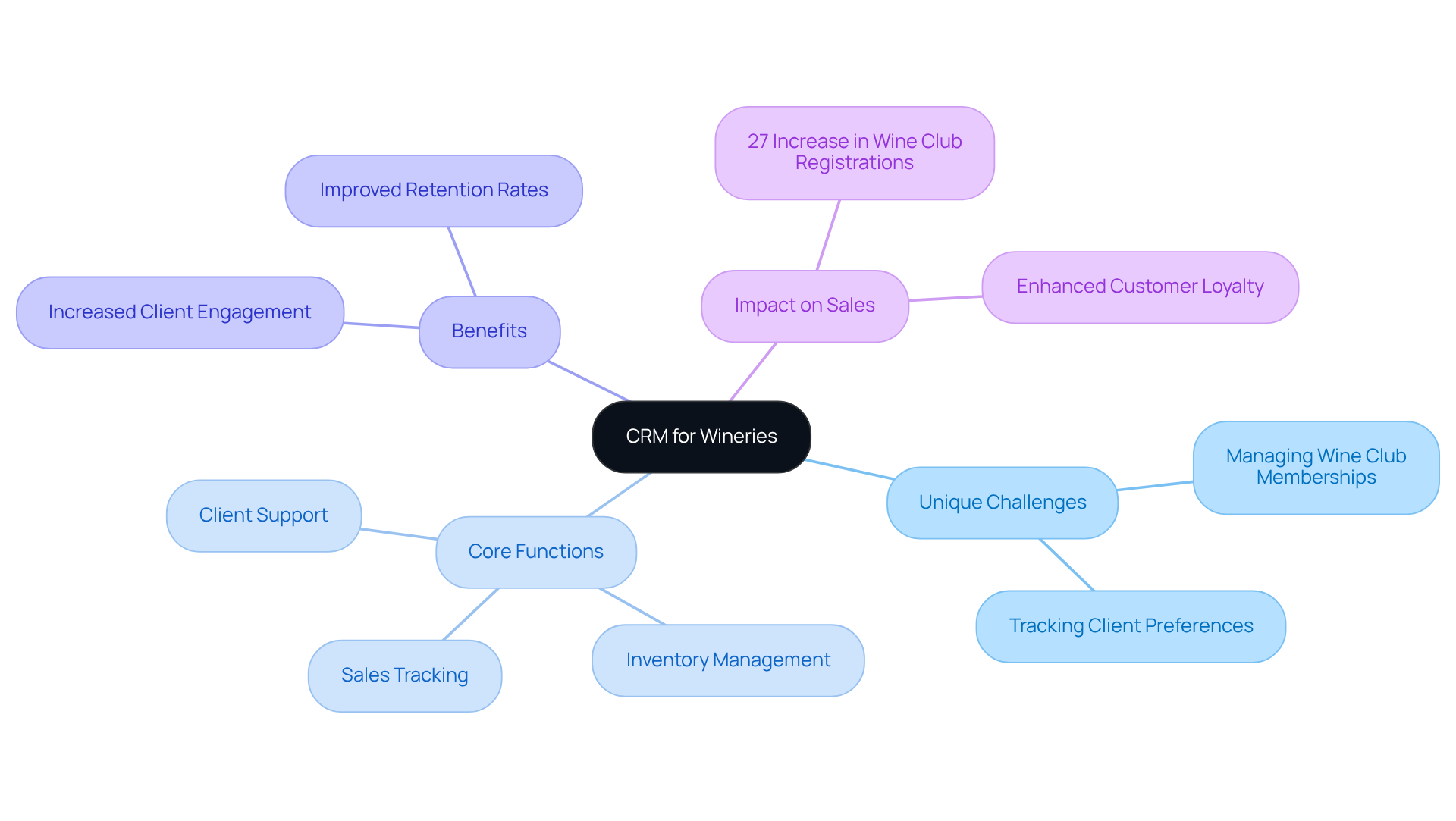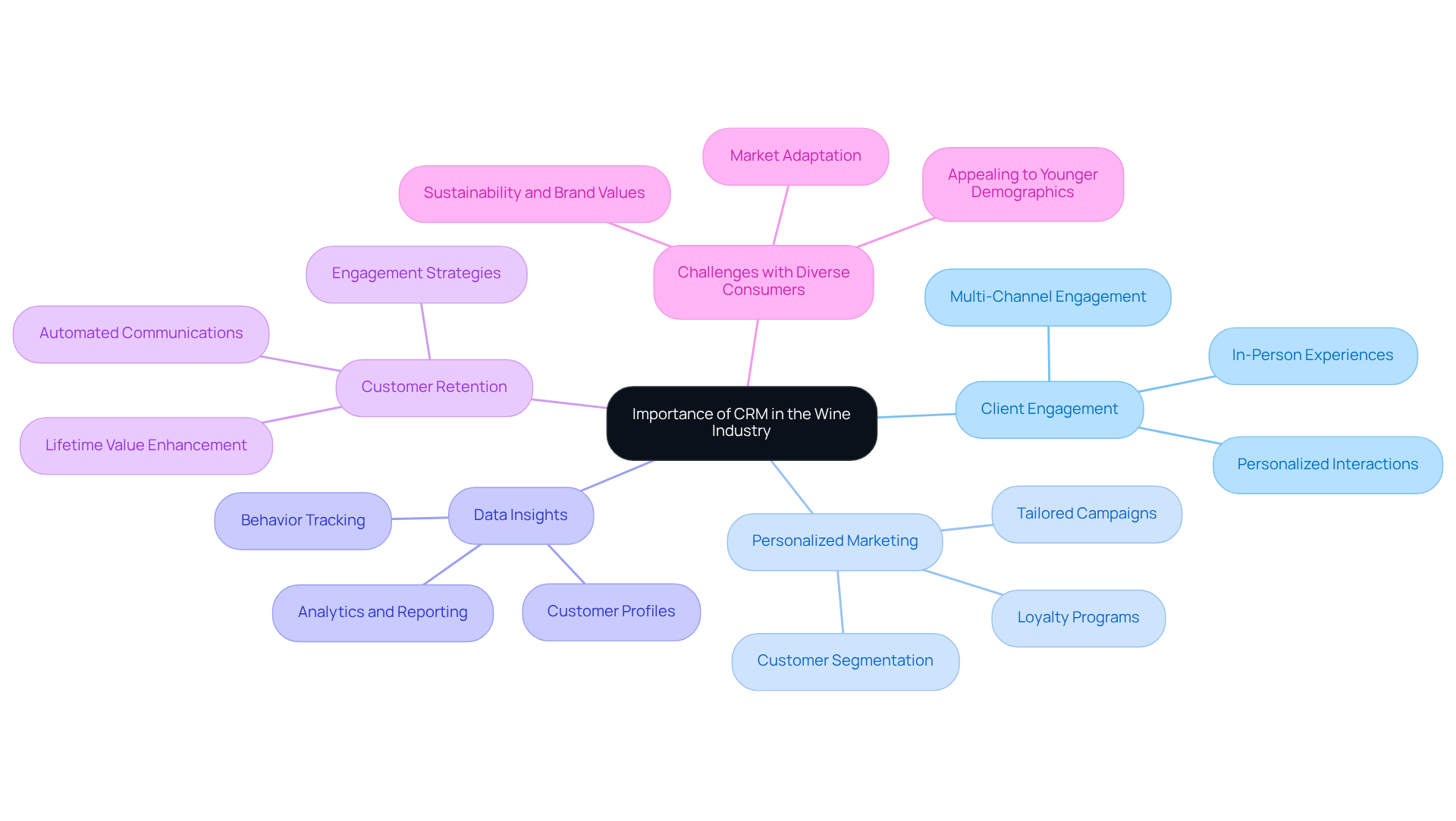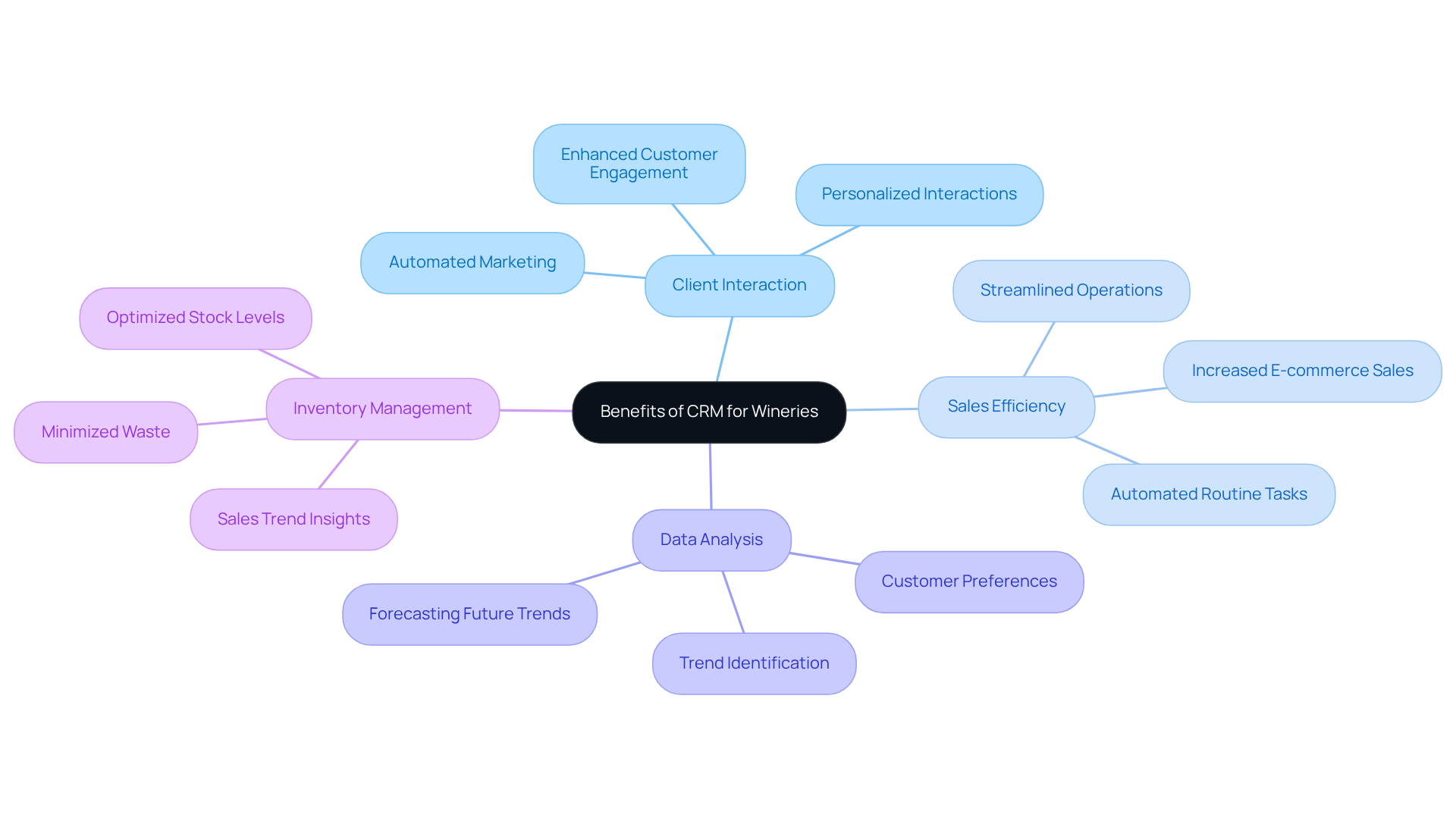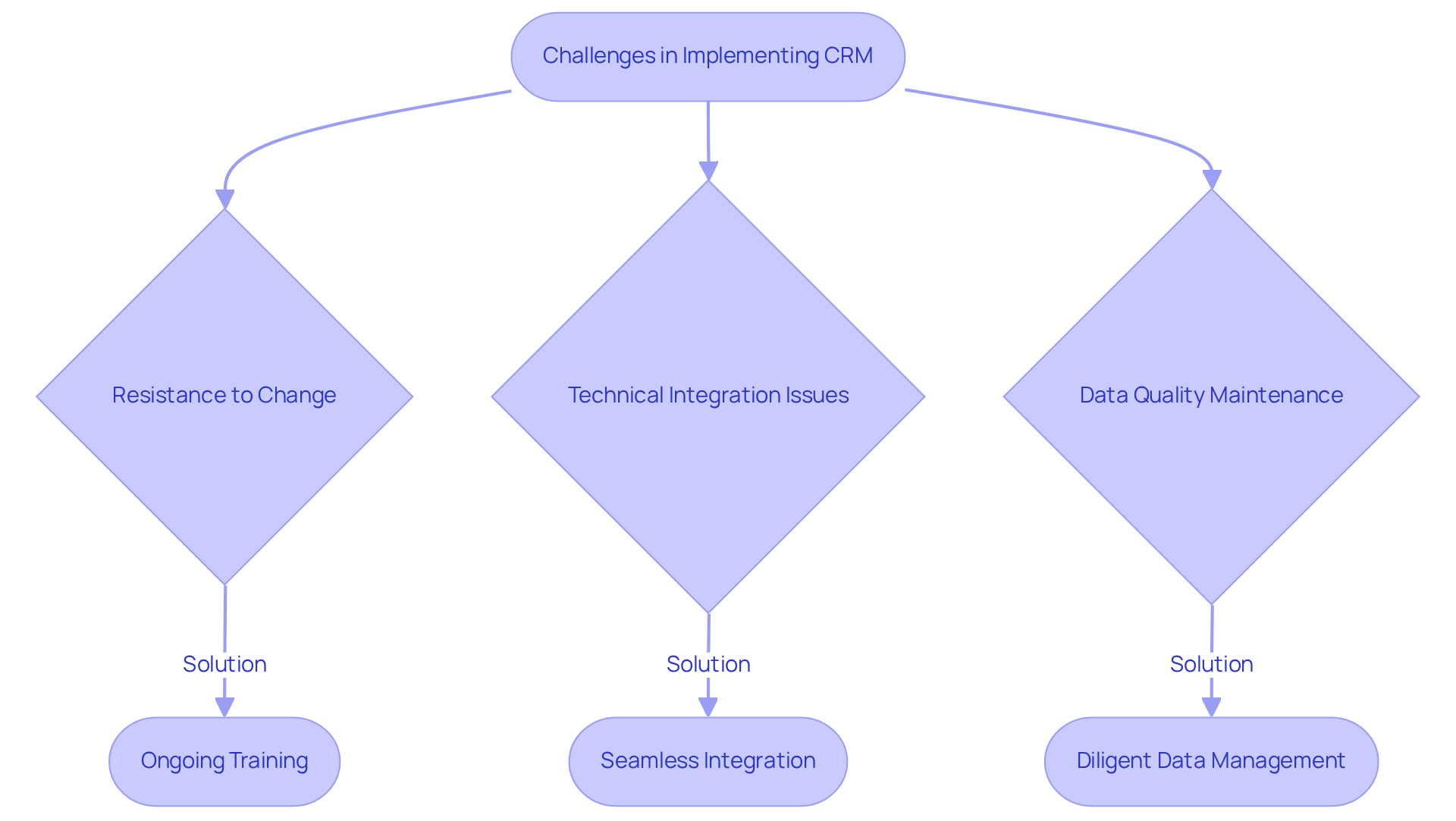Overview
CRM for wineries is indispensable, empowering vineyards to elevate client interactions, optimize operations, and enhance profitability through customized marketing strategies and data-driven insights. This article underscores this necessity by illustrating how specialized CRM systems yield significant advancements in client engagement, sales efficiency, and customer retention. Such enhancements are not merely beneficial; they are essential for thriving in the competitive landscape of the wine industry. As decision-makers in this sector consider their strategies, the implementation of effective CRM solutions stands out as a critical action for achieving sustained success.
Introduction
In the intricate world of winemaking, where every bottle tells a story, the ability to forge lasting relationships with customers is paramount. CRM systems tailored for wineries present a powerful solution, enabling vineyards to manage client interactions effectively and enhance profitability through personalized marketing and data-driven insights. As the wine industry increasingly shifts toward direct-to-consumer sales, wineries face the challenge of implementing these specialized systems. How can they ensure that these systems resonate deeply with their clientele while navigating this evolving landscape?
Define CRM for Wineries: A Specialized Approach
CRM for wineries encompasses specialized software platforms designed to enhance client interactions, streamline operations, and elevate profitability within the wine sector. Unlike generic CRM solutions, CRM for wineries addresses the , such as managing wine club memberships, tracking client preferences, and optimizing direct-to-consumer (DTC) sales. These platforms empower vineyards to efficiently collect and analyze client data, enabling tailored marketing strategies that significantly improve client engagement.
By integrating essential functions like sales tracking, inventory management, and client support, a CRM for wineries fosters stronger connections with patrons, ultimately driving sales and loyalty. For instance, vineyards utilizing advanced CRM systems have reported a 27% increase in new wine club registrations through digital channels, underscoring the effectiveness of customized solutions in enhancing client acquisition. Furthermore, leveraging data-driven insights allows vineyards to refine their marketing efforts, leading to improved retention rates and heightened client satisfaction.
In the competitive landscape of the wine industry, investing in a CRM for wineries is not merely advantageous but essential for producers striving to succeed. As industry leaders assert, a seamless and personalized client experience is vital for cultivating loyalty and propelling sales. Enocap's strategic capital advisory services can amplify this investment by providing tailored solutions for debt, equity, or acquisition opportunities, ensuring that businesses not only attract clients but also secure the necessary capital for sustainable growth. Consequently, the use of CRM for wineries emerges as an indispensable tool for fostering sustainable growth.

Highlight the Importance of CRM in the Wine Industry
The significance of CRM for wineries in the wine sector is profound, especially as producers transition towards . Efficient CRM for wineries solutions empower vineyards to meticulously track client interactions, preferences, and purchase histories, enabling personalized marketing initiatives that enhance overall client experiences. This tailored approach not only elevates satisfaction but also cultivates loyalty—an essential component in a competitive market where consumers are presented with numerous choices.
Moreover, CRM systems yield invaluable insights into client behavior, equipping vineyards to make data-informed decisions regarding product offerings and marketing strategies. By synthesizing information from wine clubs, online retail platforms, and tasting venues, producers can construct a comprehensive profile of their clientele, which is vital for understanding behavior and refining marketing tactics. For example, establishments that effectively leverage CRM can achieve elevated customer retention rates, with studies illustrating that personalized marketing significantly enhances lifetime value.
In an industry where relationships are critical, a robust CRM for wineries is essential for vineyards aiming to maintain a competitive advantage and nurture lasting connections with their clientele. As the demand for DTC sales escalates, producers must also confront the challenges of engaging younger and more diverse consumers, making the implementation of CRM for wineries even more essential. By embracing transformative DTC strategies, vineyards can enhance client engagement and convert occasional purchasers into dedicated club members. Automation within CRM platforms allows vineyards to amplify personalization while maintaining authenticity, further enhancing client engagement and supporting strategic capital planning for sustainable growth.

Explore the Benefits of CRM for Wineries
Implementing a CRM for wineries presents vineyards with a multitude of advantages, including heightened client interaction, enhanced sales efficiency, and streamlined operations. By automating marketing campaigns, vineyards can guarantee that clients receive timely and relevant communications, significantly elevating conversion rates. Notably, vineyards utilizing CRM tools have reported an impressive 191% average increase in e-commerce sales, underscoring the effectiveness of targeted outreach.
Moreover, CRM systems empower vineyards to analyze client data, revealing trends and preferences that inform product development and marketing strategies. This data-driven approach fosters , which are vital for improving client retention rates. Indeed, establishments that leverage CRM insights are able to anticipate client needs, leading to customized offerings that resonate with their audience.
Additionally, CRM tools enhance inventory management by providing insights into sales trends, enabling vineyards to optimize stock levels and minimize waste. Such operational efficiency not only bolsters financial performance but also contributes to a more sustainable business model. Overall, the implementation of CRM for wineries can yield increased revenue, strengthen client relationships, and create a more effective operational framework, making it an essential asset for vineyards aiming to thrive in a competitive landscape.

Challenges in Implementing CRM for Wineries
The implementation of CRM for wineries presents substantial benefits, yet several challenges often arise during this process. A significant obstacle is the resistance to change from staff accustomed to traditional customer management methods. Research indicates that many employees find it challenging to embrace new CRM tools due to established routines and performance-driven incentives. To counter this resistance, vineyards must prioritize , ensuring that staff grasp the importance of the new framework and its features. This training should be interactive and ongoing, rather than a one-time event, as studies show that most individuals forget a significant portion of what they learn in single-session training within a few days, thereby fostering a culture of adaptability.
Moreover, integrating CRM platforms with existing software can present technical difficulties, particularly for vineyards relying on outdated technology. Selecting a CRM for wineries that offers seamless integration capabilities is essential for minimizing disruptions and enhancing user experience. It is also crucial to embed CRM into everyday tools, making its use feel natural. Furthermore, maintaining high data quality is critical; wineries must ensure that the information entered into the CRM is accurate and up-to-date to maximize its effectiveness. By proactively addressing these challenges—through comprehensive training, strategic integration, and diligent data management—wineries can successfully implement CRM for wineries, which significantly enhances their operations and strengthens customer relationships.

Conclusion
Investing in a tailored CRM for wineries is not just beneficial; it is essential for fostering meaningful client relationships and driving sustainable growth within the competitive wine industry. This specialized approach addresses the unique challenges faced by vineyards and empowers them to streamline operations, enhance client engagement, and ultimately boost profitability. By leveraging advanced CRM systems, wineries can create personalized marketing strategies that resonate with their clientele, ensuring a more satisfying customer experience.
Key insights from the discussion underscore the importance of efficient CRM solutions in tracking client interactions, analyzing purchasing behaviors, and optimizing direct-to-consumer sales. The data-driven nature of CRM enables wineries to make informed decisions that improve retention rates and elevate customer satisfaction. Furthermore, the ability to automate marketing efforts and manage inventory effectively positions wineries to respond swiftly to market demands, enhancing overall operational efficiency.
Embracing CRM technology is not merely a trend; it is a crucial strategy for wineries aiming to thrive in an increasingly competitive landscape. As the wine industry evolves, the ability to connect with a diverse consumer base and deliver personalized experiences will define success. Wineries are urged to adopt these transformative tools, invest in staff training, and ensure seamless integration with existing systems to fully realize the benefits of CRM. By doing so, they will not only enhance their client relationships but also secure a prosperous future in the wine market.
Frequently Asked Questions
What is CRM for wineries?
CRM for wineries refers to specialized software platforms that enhance client interactions, streamline operations, and increase profitability within the wine sector, addressing the unique challenges faced by vineyards.
How does CRM for wineries differ from generic CRM solutions?
Unlike generic CRM solutions, CRM for wineries specifically manages wine club memberships, tracks client preferences, and optimizes direct-to-consumer (DTC) sales, catering to the unique needs of vineyards.
What are the benefits of using CRM for wineries?
Benefits include improved client engagement through tailored marketing strategies, enhanced sales tracking, inventory management, and stronger connections with patrons, ultimately driving sales and loyalty.
What impact can a CRM system have on wine club registrations?
Vineyards using advanced CRM systems have reported a 27% increase in new wine club registrations through digital channels, demonstrating the effectiveness of customized solutions in client acquisition.
How does data-driven insight from CRM systems benefit wineries?
Data-driven insights allow wineries to refine their marketing efforts, leading to improved client retention rates and heightened satisfaction.
Why is investing in CRM for wineries considered essential?
In the competitive wine industry, a seamless and personalized client experience is crucial for cultivating loyalty and driving sales, making CRM investment essential for producers aiming for success.
How can Enocap's services enhance the use of CRM for wineries?
Enocap's strategic capital advisory services can amplify CRM investments by providing tailored solutions for debt, equity, or acquisition opportunities, helping businesses attract clients and secure capital for sustainable growth.




